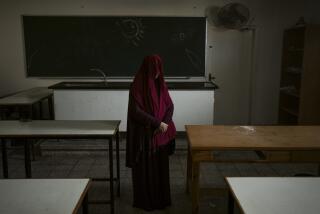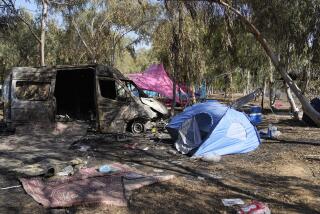U.S. Hand-Over of Muslims Stirs Bosnia Controversy
- Share via
SARAJEVO, Bosnia-Herzegovina — Beaten and tortured into signing murder confessions, seven Muslim men who were turned over to Bosnian Serb police by U.S. troops are at the center of a heated controversy over law, human rights and the actions of American peacekeepers.
Most of the men are thought to be survivors of the Serb-captured former eastern “safe area” of Srebrenica. But it is unclear what exactly the lightly armed Muslims had been doing when they galloped down a hill to surrender to a NATO artillery squad in land controlled by the Bosnian Serbs. The Serbs have branded them terrorists.
Regardless of the motives and background of the group, the North Atlantic Treaty Organization is coming under criticism for so quickly handing the men over to their bitter enemy, in whose custody human rights officials say their chances for fair treatment were scant.
Within hours of their delivery to Bosnian Serb police, the men had signed confessions following “torture [that] was intentionally inflicted by, urged by or allowed by” Bosnian Serb officials, according to an internal United Nations report.
NATO officials insist that no mistake was made and that their field commanders were following the prevailing law and customs.
In jailhouse interviews, the men told U.N. human rights investigators that they escaped July’s Srebrenica massacres and had been hiding in the nearby wooded hills ever since, emerging only recently to seek reunion with their families in the Muslim-held city of Tuzla.
Relatives from Srebrenica living in Tuzla as refugees have seen television pictures of the men and identified some of them. The men’s names also appeared on International Committee of the Red Cross lists of the missing from Srebrenica.
“I was very happy to see my brother alive [on television],” Ibro Husic said of 20-year-old Mevludin Husic. “But on the other hand, I was worried about his safety. . . . I am really mad at [NATO], because they can’t get the big war criminals but my young brother is in jail.”
Families were stunned that their relatives could have evaded Serbian capture for so long, only to be turned over to their enemy after surrendering to what they probably thought was a safe party.
As many as 8,000 Muslim men are missing from Srebrenica; every so often a few survivors straggle out of the woods.
But NATO officials point to “inconsistencies” in the men’s stories. Two wore military uniforms and all were cleanshaven or wore trimmed beards when they surrendered. They appeared to be in good health--better health, NATO officials suggest, than would be expected of someone who had spent 10 months hiding in desolate forest.
NATO officials also question why the men were headed east, away from Tuzla, when first spotted. Some NATO officers speculate privately that at least two of the men might have been part of a covert military operation that may or may not have been sanctioned by the Muslim-led Bosnian government, which in recent months has been caught running clandestine paramilitary training camps in central Bosnia-Herzegovina.
That theory too has its holes: Why, for example, were the men so poorly armed? Among the seven, they had five small knives, a couple of hand grenades and two pistols. Two members of the group, according to the Bosnian Serb police, later revealed a cache that included one AK-47 assault rifle and two long-barreled shotguns with extra ammunition.
The case of the Zvornik Seven, as the men are now known, began this way:
At midday on May 10, a U.S. Army artillery platoon on patrol about six miles into Bosnian Serb territory spied seven armed men crossing a nearby hill. There was a sudden burst of gunfire. The men sprinted toward the American patrol, claiming they had been fired upon, and tried to surrender.
U.N. international police and Bosnian Serb police arrived. After scarcely two hours of questioning, during which the American officers did not ascertain that the men were from Srebrenica but did learn that they were apparently Muslims, the U.S. troops handed the seven over to the Bosnian Serb police headquartered in Zvornik, a bastion of Bosnian Serb hard-liners.
The men were hauled off to jail, where the U.N. police were initially granted, then denied, access.
Three hours later, Maj. Gen. William L. Nash, commander of the American sector in postwar Bosnia, had second thoughts about what had happened, and dispatched Lt. Col. Anthony W. Harriman to Zvornik in a convoy of armored personnel carriers and helicopters. In several tense hours that followed, Bosnian Serbs, alarmed that the Americans were going to try to free the “Muslim terrorists,” swarmed the police station, eventually forcing Harriman’s unit to withdraw about 9:30 p.m.
The beatings started that night, according to the testimony of the Zvornik Seven. Men in police uniforms and civilian clothes pounded on them with metal rods and fists, the detainees said, until three of them confessed to the murders of four missing Serbian woodcutters. The other four “confessed” to helping dispose of the bodies.
Two badly mauled bodies have been recovered, Bosnian Serb officials say, but not identified.
U.N. police, whose job it is to monitor local police, were repeatedly denied access to the men until the prisoners were transferred two days later to a jail at Bijeljina.
NATO has since sought to deflect criticism of its handling of the affair, saying it was following the letter of the U.S.-brokered peace agreement that ended Bosnia’s 3 1/2-year war. The accord recognizes a Bosnian Serb republic, called Republika Srpska, with its own judicial system and authorities. Because the Zvornik Seven were in violation of the accord’s ban on armed groups, NATO was obliged to turn the men over to the appropriate local authorities, in this case the Bosnian Serb police, said spokesman Lt. Col. Max Marriner.
Human rights officials and other critics argue that, given the track record of the Bosnian Serb police, the NATO officers should have known the men would be mistreated.
British Lt. Gen. Michael Walker, the senior commander in charge of all ground forces, defended NATO actions, saying the seven men had to be handed over even if they were survivors of the Serbian takeover of Srebrenica.
“The fighting is over,” Walker said. “The tragedy that happened in Srebrenica has no legal bearing on crimes committed since.”
Alexander Ivanko, spokesman for the U.N. and its international police monitors, said the beatings and abuse appeared to have stopped after the U.N. protested. The men appear to be in fair condition, though some continue to ask for painkillers because of the extent of their injuries.
Ivanko said the confessions are bogus because they were obtained under duress and should not be used in any criminal proceedings. He said a vitriolic media campaign against the men in the state-controlled Republika Srpska media will make a fair trial impossible.
“It will be harder to find a jury for this trial than for O.J. Simpson,” Ivanko said Wednesday.
More to Read
Sign up for Essential California
The most important California stories and recommendations in your inbox every morning.
You may occasionally receive promotional content from the Los Angeles Times.














